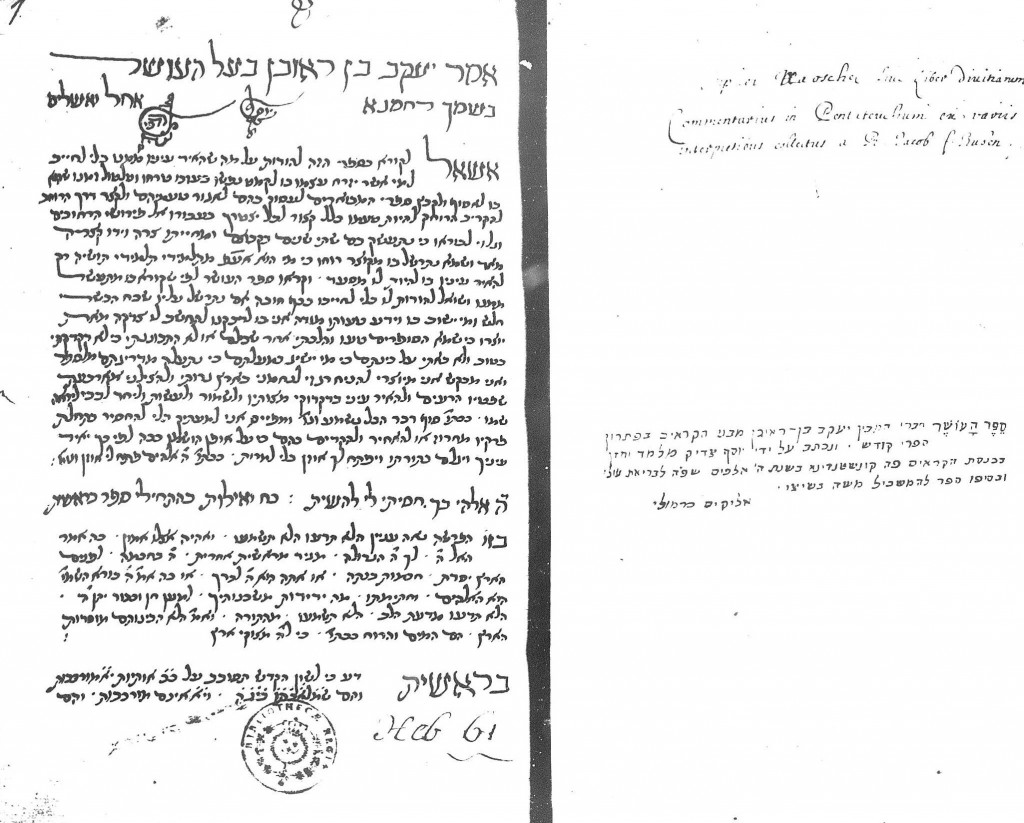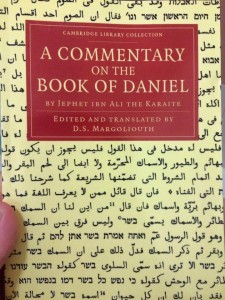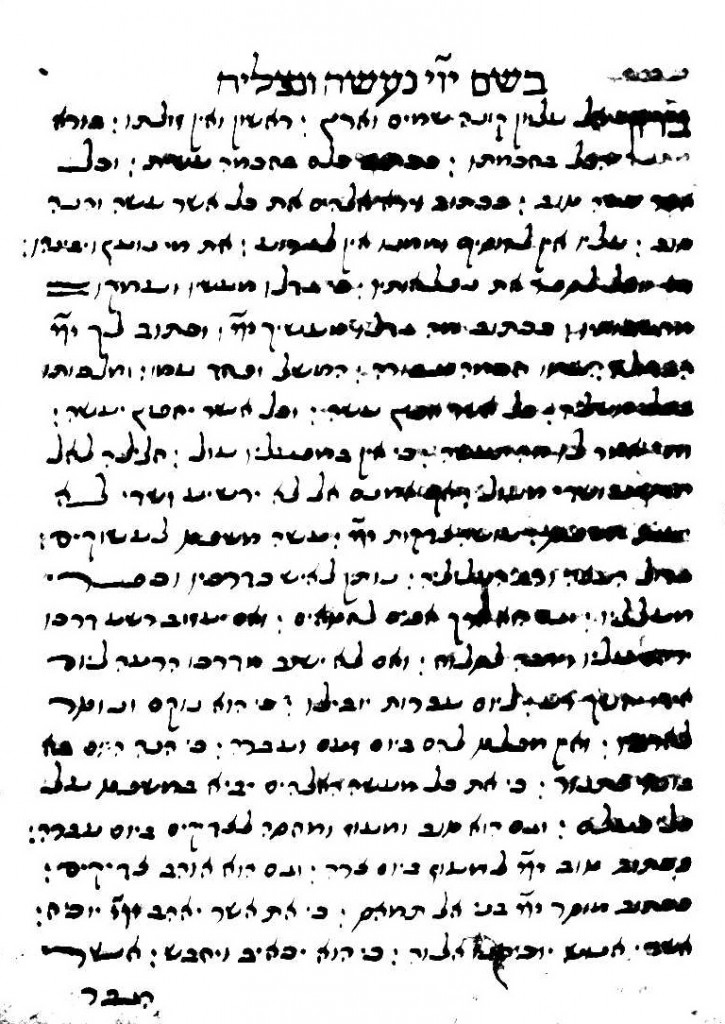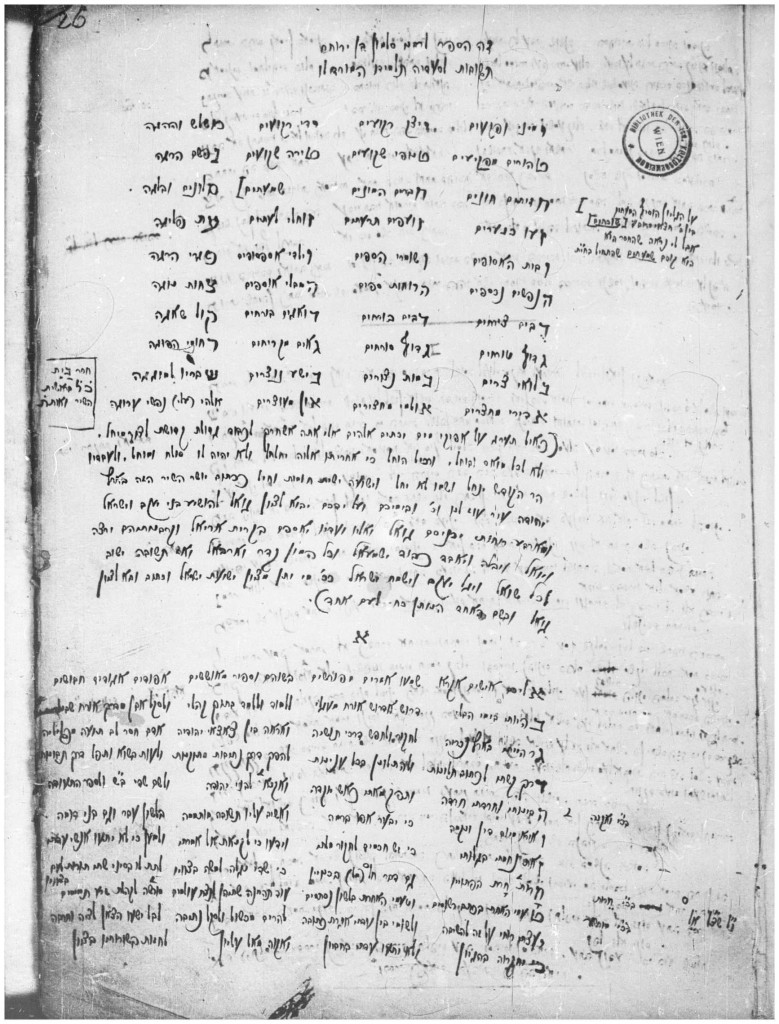B’ezrat Hashem, this November I’ll be speaking at a synagogue in Maryland. The topic for this talk is Karaite Judaism: The Rise and Fall of a Movement. Although most of what I speak about is uplifting, Karaite Jews need to come face to face with why the movement fell – and to some extent failed.
So between now and November, I’ll periodically post some snippets of the themes I’ll be talking about. And I hope to record the talk as well.
For today, I’ll focus on one of the main reasons why the Karaite movement faltered. At some point we stopped producing original literature. And even our historical literature is not available in any meaningful capacity.
Scattered in libraries throughout the world and on shelves in homes and synagogues are copies of some amazing Karaite works. Let me give you a few examples – in the hopes that someone somewhere will take up the challenge of making these works digitally available (and text-searchable) for readers.
Sefer Ha-Osher: One of the coolest Karaites around was Hakham Jacob ben Reuben. He lived about 1000 years ago and from what I can tell his works are really interesting. I say what “from what I can tell” because until recently, I had only read references to his works through the eyes of academics. But I just came across a copy of his Sefer Ha-Osher (“The Book of Riches”), which is a commentary on the entire Bible. [1.] As far as I know, the entire work has never been published.Here is a copy of the first two pages of the scan in my possession.

Commentary on Job: Another famous Karaite was Hakham Yefet ben Ali. Ken Lane over at Okie Hebrew took the Hebrew name Yefet in large part because of Yefet ben Ali. Yefet lived in the 10th Century, and I don’t believe Yefet’s commentary on Job has never been made commercially available. The version I have seen would require deciphering by an expert.
Book of the Wars of Hashem: There is also this beauty by Hakham Salmon ben Yeroham. It is his Response (“Teshuvot”) to Saadyah Gaon. The work is more commonly known as Yeroham’s Sefer Milchamot Hashem (“The Book of the Wars of Hashem”), which has been translated in part by Leon Nemoy in the Karaite Anthology. It has also been published by the late Dr. Israel Davidson of the Jewish Theological Seminary of America in a book that is no longer in print, and used copies sell for about $150.
I showed the image below to Yosef Zarnighian, who recognized it as Lithuanian in script. Dr. Davidson himself was from Lithuania. There is a theory that some of the Lithuanian Rabbanite Jewish community was of Karaite descent; so it is not surprising that the script might be Lithuanian. Joel Davidi informs me that the theory is particularly plausible with respect to the founding members of the Jewish community there.
Perhaps that’s why Litvak Jews are known for being “overly rational, skeptical, and prone to heretical thinking.” Some of the most famous Karaites today are actually from Litvak families. In any event, enjoy the manuscript.
If Karaites are going to thrive into the next century (or even through this century), we need to make our works accessible. And accessible in a meaningful and useful capacity. For example, Sefaria has done an absolutely amazing job bringing Rabbinic literature to life in the most user-friendly format I’ve ever seen. I’ll approach them to see if they are willing to do the same with historical Karaite literature. For example, it would be awesome if at the same time someone is looking up Rashi’s commentary on Bereshit, she could also find a Karaite commentary.
Moreover, for Karaites to survive, we need to start anew writing meaningful commentary and sifrei mitzvot – much more meaningful than the fluff that I write. Writing sound halakha and sound commentary is not easy. But a community without new and evolving literature will forever reminisce about the “Golden Age” and will never even come close to creating a Silver Age.
* * *
[1.] Although Wikipedia states that Sefer Ha-Osher carries no special significance with respect to Karaite biblical exegesis, the excerpts I previously read from Ankori’s Karaites in Byzantium are fascinating. For example, the work records several definitions of what a mamzer might mean. (See my comments to a previous article here.) According to Karaites in Byzantium, Sefer Ha-Osher addresses textual difficulties from a biblical (rather than Talmudic) perspective.





PRIORITIES : It is true that the production and distribution of literature (and nowadays communication technology) is crucial for the sustenance and progress of any movement and philosophy . However something must happen before that. Literature and technology do not spread themselves.The Karaites were destined to decline when they were convinced to go into the self destructive mode of insularity by not accepting converts and making marriage nearly impossible by an untenable set of rules based upon an unfounded phobia of an endogamy that was not happening . The theology of the Karaites is a treasure but treasures need to be maintained . The auto destruction accepted by Karaites was assuaged somewhat when they FINALLY began accepting converts. I said somewhat because the conversion process seems to have stalled. In my case I have been looking for conversion for over five years . The sad part is that my wife and older son are also interested in this conversion that seems to be getting further and further from reach. Literature and technology are completely dependent on living people to grow and spread. Fix the population number standards and literature will fix itself.
Well said Wolfgang!
Accepting converts with love and respect into the fold will not only build Israel but will also strengthen it.
YHVH had foreseen that the converts wouldn’t be easily accepted by Israel and that is probably why He made so many laws regarding the converts in His Torah.
May YHVH be with you and your family always.
Dear Wolfgang.
Please allow me to suggest a solution.
Go to a Reform shul, talk to aReform rabbi re conversion to Judaism,
But be honest and explain that you want to observe as a Karaite.
This should not be an issue for you or the rabbi as you can still be apart of a Jewish community but in private you are Karaite in your observance.
If one rabbi can’t help then go to another until you are happy and you find one that can help you and your family.
In my case, I live in Ireland and belong to a Reform shul but because I go to London lots I belong to a Masorti synagogue and a Reform synagogue. Then
when in Jerusalem I attend Masorti services as I also have membership in a shul there. And yet even though I have all this membership in all the above…
in private and in my own home, I am Karaite (not by birth)as that’s how I practice.
So join us, become Jewish…be part of a community and still remain honest to yourself and G-d and practice Karaite.
I hope this helps you and your family in some way, as there’s more than one solution to a problem.
Take care
G-d bless you.
Maurice
Greetings,
Many thanks for your functional solution . I have began Conservative Judaism. My desire for Karaite Conversion is as strong as ever. This is exacerbated by the fact that I am finally done with my projects in the city where I have resided for the past 39 years . We are within days of moving to our land in Tennessee in which we are starting a ranching operation in 600 acres and would like to establish it within Karaite Kosher standards. For this we would obviously need Karaite education . I would love to be of service to the community with meat and other products.
Hi – can you tell me where in Maryland you will be speaking? I live in MD and would be interested – also if you have dates. Thank you.
November 8. At the Columbia Jewish Congregation. Bring everyone!
Where in Maryland will you be speaking? I live in maryland and I’m interested in attending.
I am still working on transcribing the bit of Sefer HaOsher that you sent me (for some reason it reads crisper here than on the download), very excited. So do you have the entire work or just a portion of it?
The entire work!
Sweet! Unless you already have someone on it I’ll transcribe in pieces and send them back to you, or whoever else, to double check and proof read.
Please Do!
Shawn, we will be in Columbia to see you for sure.
This is exciting.
Shawn, could you please send me an e-mail from your personal e-mail address. I had to leave Yahoo Groups and can no longer communicate via the address you have via the Karaite Yahoo Group.
Thank you,
Jim
First, it is not a theory, but a fact, that there were (and are) Karaites in Lithuania (the largest extant communities being Trakai, Vilnius, and Ponevezys).
Second, the script in your scan of Sefer Milhamot YHWH is in Lithuanian Ashkenazi script – it is the hanwriting of Davidson, who copied the book from manuscripts in the Russian Imperial Library. That script was never used by Lithuanian Karaites. The Lithuanian Karaite script is very much the same as that of the Crimean and Turkish Karaites, which, itself, is but a variant on the same script used by Karaites in Egypt, Eres Yisra’el, and Syria.
Third, there are Karaite commentaries on the Torah that are available, for example Sefer Keter Torah by Hakham Aharon Ben-Eliyahu of Nikomedia and Sefer HaMivhar by Hakham Ben-Yosef of Sulkhat. Of the Commentaries by Hakham Yefet Ben-‘Eli, a number are in print (for example his commentary on the minor prophets Yo’el through Mikhah, which we have printed, as well as a number of his other commentaries which have been printed recently by scholars). If we can get permission from Dropsey University, who previously had published his commentary on Hoshe’a‘, Hakham ‘Ali Ben-Suleiman’s commentary on Bereshit, and Salmon Ben-Yeruham’s commentary on Tehillim, we would like to republish them as well. The one drawback for many people is that they are written in Judæo-Arabic.
Are Keter Torah and HaMivhar also in Judeo-Arabic? I was under the impression that they were in Hebrew.
Sefer Keter Torah and Sefer HaMivhar are both in Hebrew.
I have (what I believe to be) an entire handwritten manuscript of sefer hamivhar.
Cool, that one I could not find, despite many references to a translation(?) by Vadja.
Hi Avraham,
Thank you for your thoughtful response. Some reflections:
1. My point about Lithuania was not that there were or are Karaites. My point was that the Litvak rabbanites are potentially descendants of Karaites.
2. I had a suspicion of that it was Davidson’s writing when Yosef told me the document had a lithuanian script – and I even reached out to JTS to discuss the work with their publishing arm. I have not heard back. In any event, I have ordered his publication of the workr and will see what it says.
3. I agree *some* commentaries are available. The purpose of my post is that we need to get all these items and others to be more available and more affordable.
I did find a Printed photo copy of Keter at Amazon and the site that did the original scanning. When I’ve looked for it in the past nothing showed up. Must be relatively new or I overlooked it. http://babel.hathitrust.org/cgi/pt?id=uc1.b000945972;view=1up;seq=9
Amazon seems not to have Vol3 of Keter.
The complete Keter Torah is available in one large hardbound volume from the Karaite community in Israel at http://www.karaitebooks.com/Page4_952380_Article-1053.html?v=5894311625
The price is NIS160.00, which is about $41.50, which is cheaper than the $46.97 that Amazon wants for just vols.1,2, 4,&5 in paperback. Additionally, the scans at http://babel.hathitrust.org/cgi/pt?id=uc1.b000945972;view=1up;seq=9 are very poor, while the Israeli printing is nice and clear. Plus, the money goes to the community publishing fund, rather than to Amazon and the University of California.
As for Sefer HaMivhar, the last I heard was that a new printed edition was being planned in Israel, but no specific date given. In the meantime, I have a PDF of a scan of it (together with Sefer Tirat HaKasef), but only for Wayyiqra’, BeMidbar, and Devarim. I thought I had another scan of the whole thing, but cannot seem to locate it (perhaps I might find it, if I keep looking).
I think I know someone who might have the scans of the other sections. I’ll reach out. He actually is missing sections as well, so maybe you are missing the same sections. If not you can collaborate.
Thank you Hakham Qanai. The Keter is my next book purchase!
Hi, Shawn,
My cousin is a curator of Judaica at the National Library of Israel. I sent him this posting because I wondered what they might have there. Here is his answer, and a link. If you link on to the manuscript you have to go to about page 4 before you can read anything. The calligraphy is very beautiful.
We have microfilms of 12 manuscripts of Sefer Haosher. The copy that he chose is available here http://gallica.bnf.fr/ark:/12148/btv1b9064540f.r=H%C3%A9breu.langEN
Likewise, Yefet Ben Ali’s commentary to Job also exists intensive manuscripts, some of which are available online. A critical edition of the text was also prepared by somebody’s a PhD dissertation.
Solomon ben Yerucham’s responses to Sa’adia Gaon have been published a few times.
I am surprised that he is surprised that there are Karaites in Lithuania. This, I thought, was pretty well known
Hi Edna,
Thank you for this. This is wonderful. I would *love* to be in touch with your cousin.
I have some general thoughts:
– Karaites in Lithuania: I see the confusion now. My point was that the RABBINIC community in Lithuania might have been descendants from Karaites. I was of course aware that there was once a thriving Karaite community there.
– Publications: The general point is that these works are not commercially available. I have Yefet’s commentary on Job in manuscript form.
My goal is to breathe new life into Karaite literature and get these documents available online and in print and translated.
The Rabbanite community in Lithuania was NOT descended from the Karaite Community. The Rabbanite Community was part of the Polish-Lithuanian Rabbanite community which had settled in Poland after the expulsion from Germany and were Yiddish speakers. The Karaite Community of Lithuania, on the other hand, were descendants of Karaites from the Crimea that were settled along with Crimean Tatars in Lithuania hundreds of years later by the Grand Duke Vitautus (Wiltold) after his war with the Crimean Tatars and were Karaite Judæo-Tatar speakers.
BTW, Salmon ben Yeroham’s work is no longer in print, as far as I am aware.
That link is great! I can zoom in REAL close on the iffy letters. Thank you so much for sharing.
I think this is great that you are even being invited ti speak to a orthodox community ? The fact that there is a curiosity about Karites among rabbinical folks is a good sign, I see this as the need to see the big picutre of the Jewish people & our history, & to begin to learn & seek the truthI was very saddened to learn how the Rabbinical political forces persecuted the Karites…this is a very ugly part of the Jewish history..we need to let people know about this
Kol tov & Bless you for your work it is a mitzvah!
Shawn, this is really exciting news.
I think, as a rabbanite Jewish brother, that the Karaite community is really serious about mitzvoth and should always mention it when speaking to all other Jewish groups, especially the Orthodox. This is a major major point in your favour. Also the fact that Karaites believe in Torah mi’Sinai (unlike Reform/Recon/ most of Conservative).
The conclusion that the Karaite movement failed because of insufficient documentation is partly correct.
The mission should include actively refuting Talmudic Rabbinical folly with truth. i.e. Deuteronomy 4:2 and 13:1.( You shall not add anything to what I command you…..) Isn’t the Talmud adding to the words of Moses in direct disobedience to these words?
An opinion of why the Talmud wasn’t written down before the 2nd/3rd century was because of fear of disobedience to these commandments.
Increased deception finally prevailed and these words of Moses were disobeyed, and the result is the Talmud.
Was the commission given in Ezekiel 3:16-21 and 33:7-20 as a watchman to Israel only meant for Ezekiel? Or is it possible that this commission applies to all? If it applies to all, many are in trouble for all the blood that will be required for failing to warn of the wickedness today. Maybe a regular column in a major newspaper, ( J Post or Haaretz) regular articles in many Rabbinical publications, blogs and websites will remove the blood required for failure to proclaim the truth. Or a radio broadcast proclaiming truth will exonerate? Waiting for Messiah while doing nothing will not hasten His coming.
This is only *one* of the reasons the movement failed. You’ll have to see my talk for all of them.
I do not have the goal to actively refute Talmud.
Thank you for the picture of A Commentary on the Book of Daniel.
Just ordered now. I have not seen this one before.
Thank you.
Margoliouth’s translation of Yefet’s commentary on Daniel together with Hartwig Hirschfeld’s English translation of Yefet’s commentary on Nahum has been available since 2003 as a publication of The al-Qirqisani Center for the Promotion of Karaite Studies under the title “Angels and Fire: Yefet ben ‘Eli HaLewi on Dani’el and Nahum” ISBN 0970077505 and can be ordered through any bookstore or Amazon.com.
Pingback: Women, Blue Fringes and the Further Need to Revive Early Karaite Literature - A Blue Thread
There was a time where many jews followed what the kairite believed. They were called saducees and they were the priestly class . They rejected the oral torah but they didn’t break off from judaism. It’s so hard to be part of a Jewish ppl and not be understood. Yes I’m modern but I’m not modern orthodox. Too bad there’s not much of a kairite community in Canada. Although I’m not a kairite I have more in common with kairites than with jews. I only believe in one torah and don’t believe that the oral torah as written in the Talmud can be trusted but at the same time don’t believe in breaking off from my ppl.
As stated, the Sadducees preceded the new Rabbinic oral Torah. The Karaites are not falling or failing, for to follow the Rabbinic laws of unanointed men and scribes is destined to fail.
After the Rabbinic traditional second Torah was written, the Jewish people have suffered untold tragedies, holocausts and attempt to kill off the people of Hashem.
My perspective is that Hashem has seen and reported that a majority of his Jewish would turn their face away from Him and He turned His face away from the traditional laws of the men mentioned in both Torah and Nevi’im.
My relatives follow the Rabbinic tradition of their parents and ancestors and do not understand why I follow Hashem and His words written down by Moshe. I explain to them that when lemmings jump off a cliff in mass, there is no reason for all to follow them.
When the Talmud and Sages curse Hashem, I feel that it is time to follow the words of Hashem.
Read MOED, Erubin 21(b) as just one example where the Rabbi says that following the Torah’s laws of right and wrong are okay, but if you do not believe in the second Oral Torah laws, you must be boiled in excrement until dead.